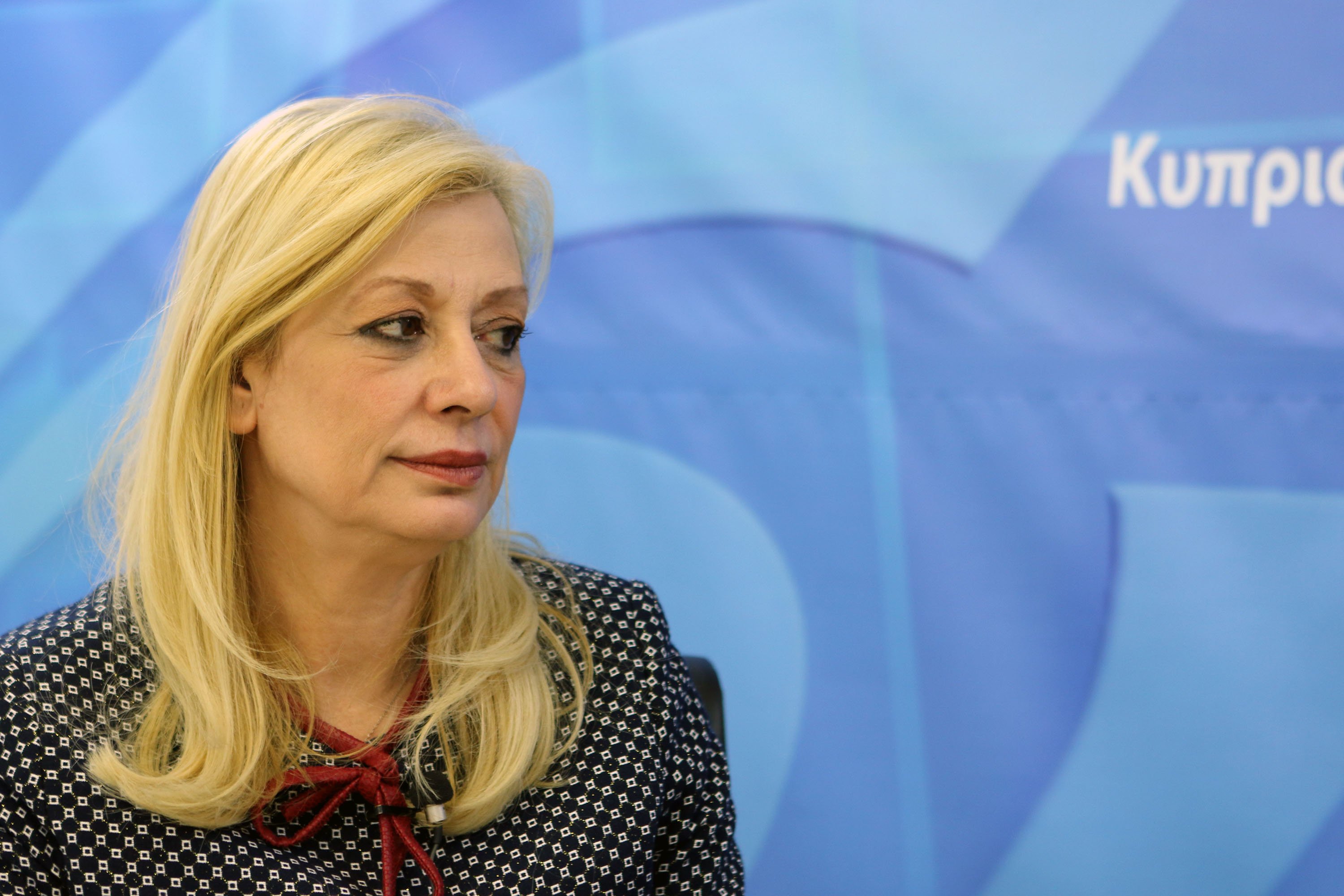Labour Minister Zeta Emilianidou, who had suffered a cerebral aneurysm last month, has died, aged 68, a government announcement said late on Monday.
The minister passed away at 8.30pm at the Ygeia medical centre in Athens where she was transported by air-ambulance after suffering a cerebral aneurysm on May 15.
“It is with deepest sorrow that the Presidency of the Republic announces that the Minister of Labour and Social Insurance Zeta Emilianidou drew her last breath at 8.30 in the evening of June 6, 2022, at the age of 68, at the Ygeia medical centre in Athens, where she was hospitalised after a ruptured brain aneurysm,” the statement said.
President Nicos Anastasiades and the government expressed their deepest condolences to her family.
Born on September 2, 1954 in Nicosia, Zeta Emilianidou earned her degree in law from the Aristotle University of Thessaloniki. She also has a diploma in marketing management from the Cyprus Institute of Marketing. She was a career civil servant before being appointed minister, President Anastasiades in 2013.
She took the Bar in 1978 and participated in the negotiations for accession of Cyprus to the EU in 2004. From 2001 to 2010 she was the director of the customs department and registrar of VAT. She was also a member of the board of the Cyprus Ports Authority.
From 2010 to 2013 she served as the permanent secretary of the ministry of energy, commerce, industry and tourism as well as president of the Cyprus Energy Foundation and the Special Fund for renewable energy sources and energy saving.
During her many years of service, she was the head of the team that prepared the present customs legislation of the Republic and a member of the team that drafted and prepared VAT legislation.
She is the author of the book entitled “Value Added Tax in Cyprus” published in 1992, the year that the VAT legislation first came into force.
As a ministry permanent secretary, she was responsible for the completion of the second round of hydrocarbon exploration licences in offshore areas of Cyprus and was the chairwoman of the advisory committee, which was responsible for the evaluation of the applications of the companies that expressed interest, which eventually led to the signing of contracts for five exploration blocks in Cyprus’ EEZ.
On April 3, 2013, she was appointed Minister of Labour and Social Insurance by Anastasiades, and stayed in the post for the duration of his presidency. She was widely respected as a minister who was trusted by unions and employers organisations.
Emilianidou was seen to be in touch with the needs those she was tasked to help as the minister responsible for social welfare despite the challenges posed by government bureaucracy and the disruptive transition to digital systems that have seen delays in the payment of benefits, which she was quick to acknowledge.
As minister, Emilianidou promoted a series of reforms with particular emphasis on social welfare issues, workers’ rights and gender equality issues at a time when Cyprus was still going through a financial crisis, and more recently a pandemic, coupled with an ever-increasing number of refugees and migrants needing financial support.
According to her own message on the ministry’s website, among the most important reforms and policies she has promoted during her tenure were the guaranteed minimum income, the creation of the deputy ministry of social welfare, strengthening the standard of living of low-income pensioners through an increase in their incomes above the poverty line, a subsidy for care provision, free movement on public transport, fully subsidised four-day holidays and a series of other measures for the benefit of the elderly,
Her ministry also introduced the widower’s pension to men on the same terms as for women for the first time, introduced paid paternity leave, amended child benefit legislation for large families, and introduced a special pension for people over 50 with thalassaemia.
Emilianidou also oversaw the preparation and implementation of the national strategy for the protection of children from sexual exploitation and child pornography, the creation of Woman’s House for victims of domestic violence and better housing for people with severe disabilities so they did not have to be institutionalised.
Her ministry also introduced the recognition of maternity through surrogate mothers and payment of maternity allowance to both surrogate and biological mothers, increased maternity leave for the second and third or each subsequent child by four and eight weeks respectively, as well as increasing by an additional four and six weeks in the case of twins or triplets respectively.
The ministry also oversaw the implementation of the special employee support schemes in response to the pandemic.
Most recently, she was engaged in discussions for a minimum wage, an issue that has become more contentious due to the inflationary crisis.







Click here to change your cookie preferences